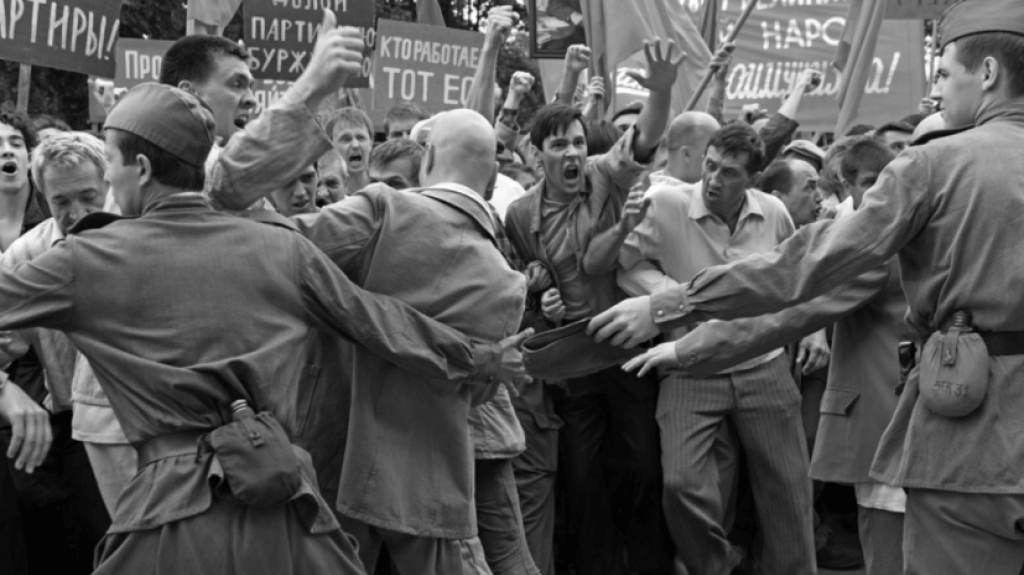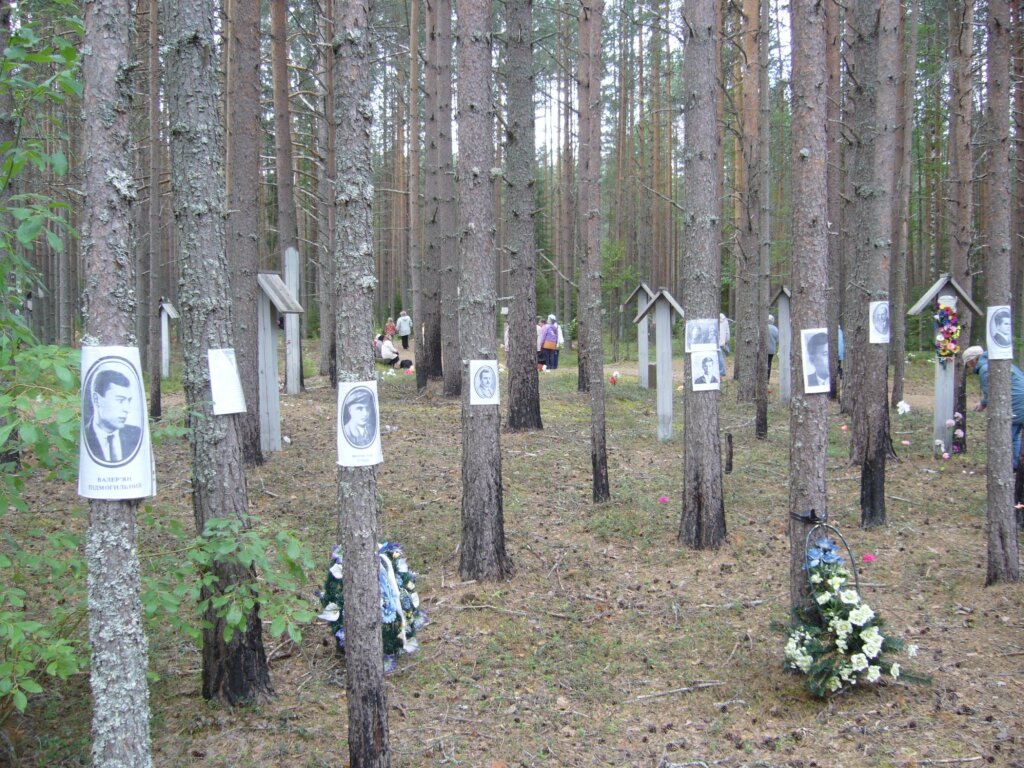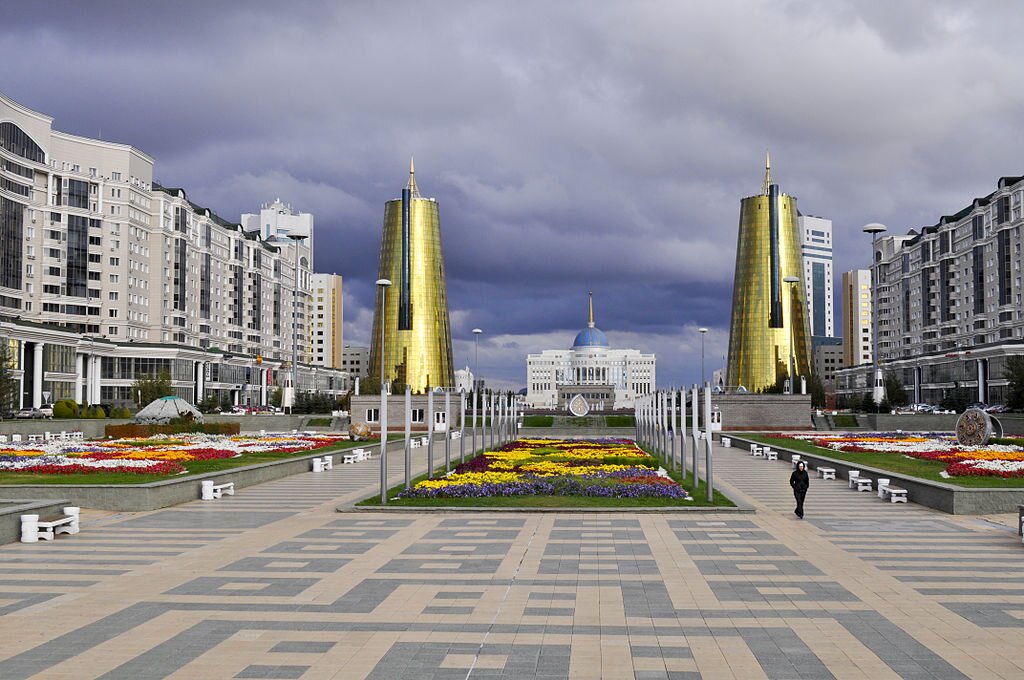This is Part I in a two-part series. Part II will follow Tuesday, 2/23.
A review of Dear Comrades!, Dir. Andrei Konchalovsky, 2020. 121 mins. Available on Hulu.
Peter Rutland is a professor of government at Wesleyan University in Middletown, Connecticut.
Dear Comrades! is Russia’s official entry for Best Foreign Language Feature at the 2021 Academy Awards. It recalls the dramatic events of three days in June 1962, when workers in Novocherkassk, a provincial town in the south of Russia, rose up to protest low pay and food shortages.
The film raises important questions about the role of cinema in constructing our understanding of the past, especially when it comes to sensitive events which were buried by the authorities and hidden from public view for decades.
The film’s artistic qualities and superficial willingness to confront a tragic chapter of Russian history have attracted glowing reviews from some Western critics and may win director Andrei Konchalovsky his coveted Oscar. But the film leaves a lot to be desired as a piece of historical analysis, and in its implications for state-society relations in Russia today.
The protests in Novocherkassk were the largest outburst of worker unrest in Russia between the Kronstadt rebellion of 1921 and the coal miners’ strikes of summer 1989. The Novocherkassk incident was one of the reasons cited by Communist Party leaders when they ousted First Secretary Nikita Khrushchev in 1964. It was the first time in Russia’s 1,000-year history that a leader was peacefully removed from power.
The worst nightmare of a communist state is to have the proletariat turn on the authorities, demanding a decent life for ordinary people.
The protests were spontaneous, triggered by an announcement on May 31 that the nationwide price of meat and dairy products would increase by 25-30% from the next day, “at the request of the working people.” On the morning of June 1, workers in the steel foundry at the locomotive factory announced a strike. They were joined by the majority of the plant’s 14,000 employees, who also blocked a nearby inter-regional train line. Discontent had been brewing because of a hike in work norms earlier in the year, tied to the production of a new locomotive — which was to be the largest in the world, in keeping with Soviet aspirations to be the biggest and the best.
On the morning of June 1, when the workers confronted director Boris Kurochkin, he was aggressive and said they should eat liver pies if they could not afford meat. (He was presumably unaware that he was echoing Marie Antoinette’s fateful “let them eat cake” line.)
The strikers overpowered local police who were sent to the factory. KGB agents and army units were dispatched to the town, though one general refused to order his troops to fire and was dismissed. Half-hearted efforts to negotiate with the strikers faltered: the protesters had neither a clear set of demands nor leaders to articulate them. Khrushchev immediately sent four Presidium members from Moscow to handle the situation: second secretary Frol Kozlov, Anastas Mikoyan, Andrei Kirilenko and Dmitry Polyansky.
On the second day, the strikers marched into the center of Novocherkassk, joined by workers from other factories in the city. They attacked the police station to free detainees from the previous day’s protest, and ransacked the offices of the Communist Party city committee (gorkom). Soldiers subsequently deployed in the square in front of the party building and opened fire on the crowd, killing 22 and wounding 45. (Some reports cite higher figures). It appeared that the soldiers fired into the air, while KGB snipers on the roofs of surrounding buildings shot down into the crowd. KGB agents had been circulating among the strikers gathering intelligence. Some 112 protesters were arrested and sentenced to long (10-15 year) jail terms. Seven of them were executed.
The bodies of the slain were buried in secret locations (and were finally unearthed in 1992). The authorities imposed a news blackout on the town: no information about what happened was reported in the national media. Although the system of mass terror had been dismantled after Stalin’s death in 1953, the Soviet state’s capacity to monitor and repress the population was still in place, as was the leadership’s willingness to use ruthless force.
The Novocherkassk massacre was discussed in Alexander Solzhenitsyn’s Gulag Archipelago (published in the West in 1974) but remained virtually unknown inside the Soviet Union until Gorbachev’s glasnost era. In 1996, Boris Yeltsin visited the town, and the victims were officially rehabilitated. In 2008 Putin himself laid flowers at the town memorial. However, later that year sociologist Yevgeny Gontmakher was threatened with prosecution for incitement to extremism for writing an article in which he warned of a possible repeat of a Novocherkassk incident given the dire economic situation in many of Russia’s provincial towns.
Among those present in the square on that fateful June day was a 12-year old boy, Aleksandr Lebed. He climbed a tree to get a better view — and saw other people in the trees hit by the soldiers firing into the air. Lebed is a veritable Zelig, present at many of the key events of modern Russian history. A career soldier, he commanded a paratroop battalion in Afghanistan, and was stationed in Georgia and Azerbaijan when troops put down nationalist protests in 1989-90. As deputy commander of airborne troops during the August 1991 coup, he refused an order to storm Boris Yeltsin’s White House. In 1992, as head of the 14th Army in Moldova, he opened fire on Moldovan forces, enabling the pro-Russian Trans-Dniester region to secure self-rule. He ran for the presidency in the presidential election of 1996, throwing his support behind Yeltsin and helping secure his victory in the second round. Lebed then negotiated the agreement that ended the first Chechen war. In 1997 he visited New York City, met Donald Trump and invited him to Moscow. The next year he was elected governor of Krasnoyarsk, where he died in a helicopter crash in 2002.



